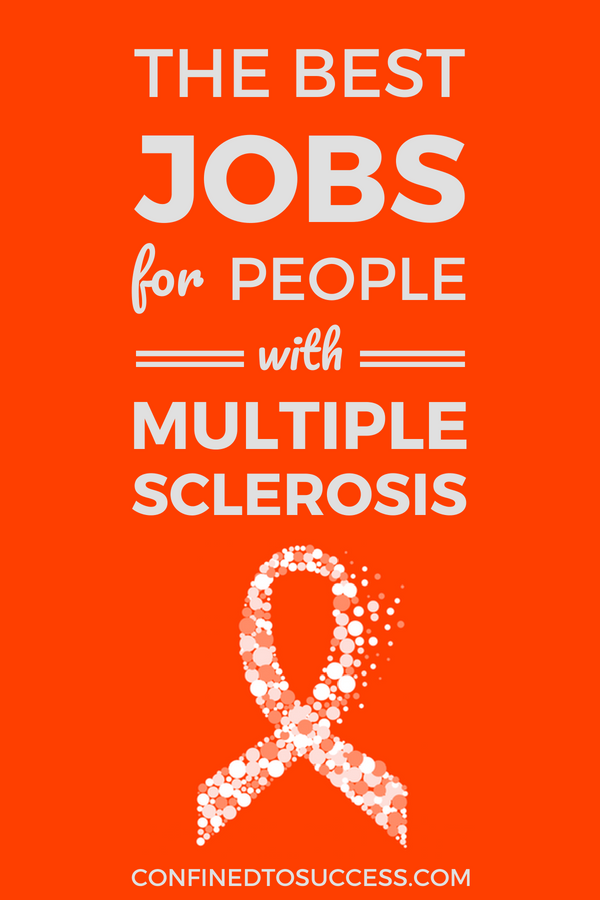Best (And Worst) Jobs For People With Multiple Sclerosis

For many people, a diagnosis of multiple sclerosis (MS) means having to rethink an entire career path. While some individuals opt to leave the workforce altogether, many find working increases their overall quality of life. [source] If you’re struggling to work out how to balance your MS symptoms and your career, check out this guide!
HOW TO IDENTIFY THE RIGHT JOBS FOR PEOPLE MULTIPLE SCLEROSIS
The first thing to determine when deciding what jobs might be right for you is to identify your own skills, talents, interests, and limitations. This will help narrow down your search and keep you from feeling overwhelmed by the sheer number of options available.
You’ll also want to talk with your doctor about your condition and see what he or she recommends as far as working. Take time to assess your own limitations so you can decide whether you want to look at full or part-time employment, and what physical tasks you might be comfortable with.
But remember that soon after a new exacerbation of your condition isn’t a good time to do this assessment. Your emotions will be running high and you won’t yet have a good grasp on how these changes will affect your day to day life. So, give it some time before deciding how to move forward.
Don’t rule out your current position right away, either. The Americans with Disabilities Act assures your right to continue in your current position provided you can still perform the work with reasonable accommodations. [source] Talk to your supervisor or HR department about your needs and whether they can be accommodated in your current position.
THE WORST TYPES OF JOBS FOR PEOPLE WITH MULTIPLE SCLEROSIS
Here are a few job types people with multiple sclerosis should avoid and why:
Highly Physical Careers
Some jobs require a lot of physical effort, which can be difficult or impossible for some people with MS. Jobs such as police work, personal training, and some health care positions are probably going to be a poor fit for you.
However, just because those careers aren’t ideal doesn’t mean they should be written off entirely. Working as a dispatcher for emergency services, healthcare administrator, or personal fitness advisor are much less physically demanding, while still allowing you to put existing experience and skills to good use.
Heavy Equipment Operation
Because MS can cause both mental and physical deterioration, it’s often not safe for people with multiple sclerosis to operate heavy equipment, including vehicles, construction and demolition equipment, as well as some machines in a factory setting. Everyone’s condition is unique, but as MS is often progressive, it’s probably a good idea to consider alternatives as your condition may change and make it impossible to continue in this career path.
Jobs with Extensive Travel
Traveling can be tough even for those without MS. Try to avoid positions such as working as a sales representative, which could require travel to a wide range of locations. Not only is it physically demanding, it also puts you at risk if you were to suffer new or worsening symptoms away from your doctor, who’s presumably most familiar with your case and treatment. If you’re already in a travel-heavy position, ask your supervisor about telecommuting or video conferencing instead of scheduling in-person meetings.
WORKDAY TIPS AND TRICKS FOR PEOPLE WITH MULTIPLE SCLEROSIS
Let your employers know if you need accommodations. After all, you can’t receive help you don’t ask for! Your company is required by law to provide reasonable accommodations to help you do your job, so be sure to keep them updated if your condition changes and you need new or different accommodations.
This also includes the interview process; while you’ll be required to discuss your condition if you request accommodations, it can be helpful to have it out in the open from the beginning, especially as it can help you get a sense of an employer’s attitudes and values. Here are some more tips:
- Know Your Limits – Your condition is likely to change over time, so you may need to regularly reassess how your work affects your health, happiness, and overall well being. If you’re feeling overly fatigued or drained, it may be time to dial back your work obligations so that you can maintain a high quality of life.
- Try Small Changes First – If you’re having trouble, for example, navigating your workspace due to a wheelchair, don’t despair of the job entirely. Try switching to a headset so you don’t have reach over your desk for the phone, and try an adjustable keyboard deck and monitor for your computer so you can comfortably reach and view your equipment. Of course, these changes may not resolve your issues, but it’s worth a try to see if they can improve the situation before moving on to larger accommodations.
- Consider Your Work Week – Depending on the type of work you’re doing, you may find that some days are busier and stressful than others (for example, retail stores tend to be busiest on weekends). If these hectic times seem too fast-paced and stressful for you, consider changing your work hours to when the pacing may be more appropriate (instead of reducing your work hours). If fatigue is still a problem, and telecommuting is an option for your job, try working from home for one day or more each week to see if that provides the relief you need.
THE BEST JOBS FOR PEOPLE WITH MULTIPLE SCLEROSIS
So, given the information outlined above, what jobs should you concentrate on as an MS sufferer? Well, here are a few potential ideas to help get you started:
Tutoring
While the strict schedule of a school day may not be ideal for someone with MS, tutoring can be a great alternative as it allows you to work at your own pace with as many (or few) clients as you’d like.
Tutoring allows you to draw on your areas of expertise and the freedom to choose the grade levels you prefer to work with. You can even offer tutoring sessions online, or in your own home. Another idea is to record video lessons as tutorials for greater flexibility!
Administrative Positions
Jobs that allow you to work while seated and require minimal physical engagement tend to be a good fit for many people with MS. If you enjoy helping customers, coordinating schedules, or any of the many other administrative tasks that are necessary to keep a business or organization running smoothly, check out these types of positions!
Work from Home Options
Today, there’s a huge range of options available for people interested in making a living working from home. Typically, all you need is an internet connection and computer, though some work-from-home opportunities, such as medical transcription, might require additional equipment.
You might consider becoming a full or part-time freelancer on job sites like Upwork.com and Freelancer.com and seek out any one of dozens of opportunities such as graphic design, content writing, social marketing, or video editing.
Or perhaps you’re good at crafts, in which case selling your work on Etsy or eBay might be a good option. You could even educate others about multiple sclerosis by starting a health blog!
A good way to make some extra cash is by filling out surveys online. While not exactly a long-term strategy, surveys are still an easy way to earn an income online while pursuing other work-from-home opportunities.
Personally, I’m most partial to passive income opportunities like affiliate marketing, which allows you to earn commissions by promoting companies’ products and services on websites not unlike this one.
NOW IT’S YOUR TURN!
What jobs for people with multiple sclerosis would you recommend? How have you dealt with multiple sclerosis in the workplace in the past? Leave your comments below!






